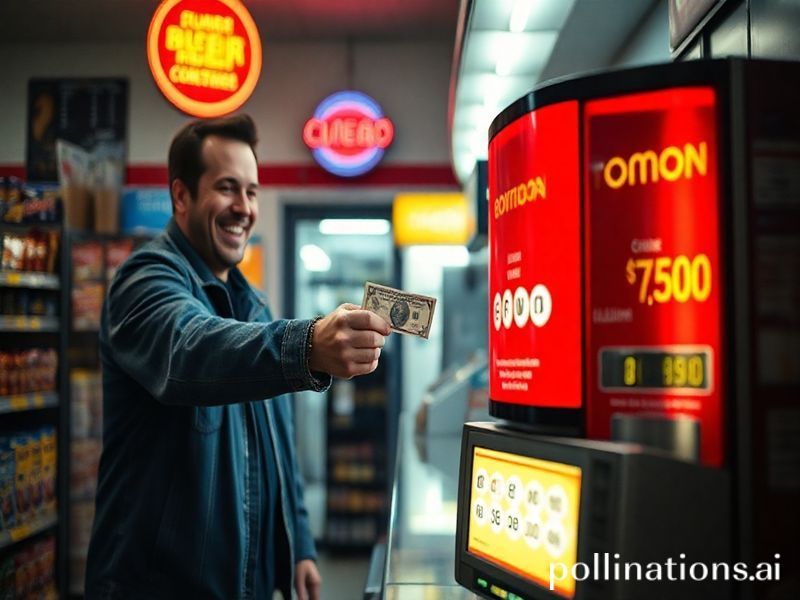where to buy powerball tickets
Where to Buy Powerball Tickets: A Globe-Trotting Guide to the World’s Most Expensive Daydream
By Dave’s Foreign Correspondent, Still Jet-Lagged and Morally Ambiguous
NEW YORK – If you’ve glanced at the headlines lately, you’ll know the Powerball jackpot has swollen to a sum that would make a small nation blush—roughly the GDP of Iceland, minus the geothermal guilt. At $1.3 billion (and climbing faster than global sea levels), the prize is large enough to be measured in F-35 fighter jets, Olympic stadiums, or, if you prefer, the annual coffee budget of any Fortune 500 CEO. Naturally, half the planet now wants in, which raises the delicate question: where, exactly, does one purchase these glittering slips of statistical despair?
The short, brutal answer: 45 U.S. states, D.C., Puerto Rico, and the U.S. Virgin Islands. The longer, more amusing answer involves tourists, offshore websites, and the kind of legal loopholes usually reserved for multinational tax avoidance. Let’s take the scenic route.
Domestic pilgrims can line up at any gas station whose fluorescent lighting screams “existential crisis.” There, beneath the rotisserie hot dogs and energy-drink shrines, you’ll find the familiar red-and-white terminals. Insert cash, choose numbers, and—if you’re feeling especially nihilistic—add the Power Play multiplier, which is basically the lottery’s version of “supersize me.” The ritual takes thirty seconds, or roughly the time it takes to forget compound-interest math.
International visitors, however, must resort to creativity. Canadians, ever polite, simply cross the border clutching their passports and a pocketful of Loonies, politely asking border guards if Niagara Falls has a lucky kiosk. Spoiler: it does. Mexicans can pop into Texas or Arizona, though recent political theatrics mean the queue now includes a free civics lecture. Europeans, accustomed to state-run lotteries that at least pretend to fund culture, arrive in Manhattan expecting Mozart and leave with a bodega scratch-off and a slice of dollar pizza. Cultural exchange at its finest.
For those who can’t obtain a U.S. visa, the internet offers a gray-market smorgasbord. Scores of courier services—incorporated in jurisdictions whose primary exports are shell companies—promise to buy your ticket and store it in a fireproof vault in Delaware. You wire money; they email you a scan. If you win, they claim the prize on your behalf, subtract a “modest” 15 percent service fee, and send you the remainder via crypto, carrier pigeon, or whatever money-transfer method hasn’t yet been sanctioned. Consumer-protection lawyers call this “problematic.” Everyone else calls it Tuesday.
The geopolitical subplot is delicious. China’s Ministry of Foreign Affairs has warned citizens not to gamble overseas, yet state media breathlessly reports every record jackpot as proof of American decadence—while simultaneously selling Macau junkets. Meanwhile, sanctioned Russian oligarchs reportedly funnel winnings through Cypriot trusts, because nothing says “economic resilience” like laundering your luck.
Why does a quintessentially American lottery fascinate the planet? Because it’s the purest distillation of late-stage capitalism: a voluntary tax on hope, marketed with the subtlety of a carnival barker, promising an escape hatch from precarity that statistically favors the already comfortable. In an era when billion-dollar valuations bloom like mold on bread, the Powerball jackpot is simply the most honest IPO around. Buy in for two dollars; receive a week-long fantasy in which climate change, medical debt, and student loans evaporate faster than the middle class.
Of course, the odds remain 1 in 292.2 million—slightly worse than being struck by lightning while texting on a plane piloted by a cryptocurrency influencer. Still, as any behavioral economist will tell you (between TED Talks), humans are terrible at evaluating tail risks. We insure against asteroid strikes and happily wager on six ping-pong balls, because despair is easier to price than optimism.
So, dear reader, should you find yourself in the United States—or in a browser tab routed through a VPN in the Caymans—remember three things: (1) You’ll probably lose. (2) If you win, your cousin’s roommate’s dog will discover litigation. (3) The ticket is, at minimum, a souvenir from the twilight of meritocracy. Frame it next to your student-loan statement; call it modern art.
And if the jackpot keeps rolling? Well, there’s always next week. The planet will still be melting, but at least the line at the gas station will be shorter.







